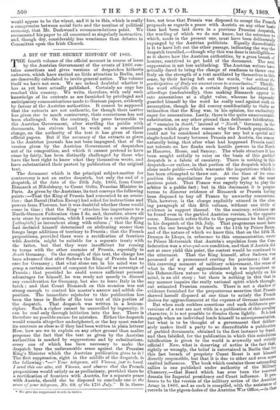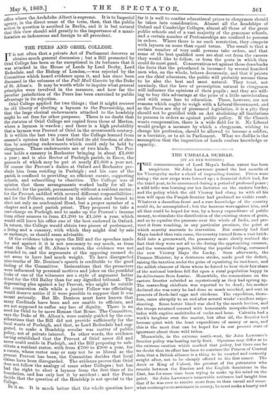A BIT OF THE SECRET HISTORY OF 1866.
THE fourth volume of the official account in course of issue by the Austrian Government of the events of 1866 contains assertions and gives versions of despatches hitherto unknown, which have excited no little attention in Berlin, and are deservedly calculated to invite general notice. The volume itself we have not seen. We are indeed doubtful whether it has as yet been actually published. Certainly no copy has reached this country. We write, therefore, with only such knowledge of its contents as are furnished by privileged and anticipatory communications made to German papers, evidently by favour ot the Austrian authorities. It cannot be supposed that the extracts are not authentic, for though their matter has given rise to much controversy, their correctness has not been challenged. On the contrary, the press favourable to the Austrian Government, after startling the public with documents, has striven hard to work out a sensational charge, on the authority of the text it has given of these official papers. But if the accuracy of the extracts as given in the Austrian journals has not been impugned, that of the version given by the Austrian Government of despatches not of its composition, and which it cannot pretend to have come by fairly, has been distinctly challenged by those who have the best right to know what they themselves wrote, and have substantiated their protest by publication of the original text.
The document which is the principal subject-matter for controversy is not an entire despatch, but only the end of a despatch, of the date of the 20th July, 1866, from Count Bismarck at Nikolsburg, to Count Goltz, Prussian Minister in Paris. As given by the Austrians, its text conveys the following points :—That the King of Prussia had consented to an armistice; that Barral (Italian Envoy) had asked for instructions and powers from Florence, but it was doubtful whether these would come in time ; that the King "attaches less importance to a North-German Federation than I do, and, therefore, above all sets store by annexation, which I consider in a certain degree [allenfalls] as incumbent along with reform ;" that the King had declared himself determined on abdicating sooner than forego large additions of territory to Prussia ; that the French propositions, provided there were a rectification of frontiers with Austria, might be suitable for a separate treaty with the latter, but that they were insufficient for coming to terms with the other enemies of Prussia, especially in South Germany. On the strength of this text, the charge has been advanced that after Sadowa the King of Prussia had no care for Germany ; that what alone ran in his mind was to grasp a certain amount of conquest for himself as sovereign of Prussia ; that provided he could secure sufficient personal advantages for himself, he was ready not merely to discard any consideration for Germany, but also to leave Italy in the lurch ; and that Count Bismarck on this occasion was not strong enough to control his master's narrow and selfish disposition. The immediate rejoinder to this publication has been the issue in Berlin of the true text of this portion of the despatch. That despatch was written in a lexiconcipher. Such a cipher cannot be unravelled by ingenuity, it can be read only through initiation into the key. There is therefore no possible excuse for mistakes. Either the despatch would remain altogether undeciphered, or the key must render its contents as clear as if they had been written in plain letters.: Now, how are we to explain on any other ground than malice prepense the fact that the text as given by the Austrian authorities is marked by suppressions and by substitutions, every one of which has been necessary to make the despatch bear the unfavourable sense against the Prussian King's Minister which the Austrian publication gives to it ? The first suppression, right in the middle of the despatch, is the following : *—" Your telegram, viel Vienna, just to hand. I send this one also, via. Vienna, and observe that the French propositions would satisfy us as preliminary, provided there be a rectification of frontiers with Austria, for a separate peace with Austria, should she be disposed to conclude one in the sense of your telegram, No. 68, of the 17th July." It is, there fore, not true that Prussia was disposed to accept the French proposals as regards a peace with Austria on any other basis than had been laid down in a previous Prussian despatch the wording of which we do not know, but therefeerreedin 4ft btlyo: which, made in the present one, must have been deliberatel expunged by the Austrian publicists. Equally dis
is it to have left out the other passage, indicating the way the despatch travelled,—though why this was done is intelligible,— as it shows how the Austrian authorities, by a gross breach of honour, contrived to get hold of the document. The next suppression is not less unblushing. The Austrian writers have actually dared to bring the charge of readiness to throw over Italy on the strength of a text mutilated by themselves in this sense, by their having left out the words, "but without the participation of Italy we cannot come to a conclusion." Thirdly, the word allenfalls (in a certain degree) is substituted fOr allerdings (undoubtedly), thus making Bismarck appear to rate annexations at a slight value, whereas he expressly guarded himself by the word he really used against such an assumption, though he did convey confidentially to Goltz an intimation that the King was, in his opinion, too exclusively eager for annexations. Lastly, there is the quite unaccountable substitution, on any other ground than deliberate falsification, of "enemies in South," instead of "North," Germany, in the passage which gives the reason why the French propositions could not be considered adequate for any but a special and single-handed treaty between Prussia and Austria, the reason naturally being, that after what had happened Prussia could not tolerate on her flanks such hostile powers in the North as Hanover, Hesse, and Saxony. The whole structure it has been sought artfully to raise on the basis of this garbled despatch is a fabric of casuistry. There is nothing in this despatch—or rather, in that portion of the despatch which alone made public—which warrants the imputations which it has been attempted to throw out. At the time of its composition the negotiations for peace were just at the most anxious point. That France was eagerly trying to play the arbiter is a public fact ; but in this document it is preposterous to discover evidence of Bismarck or Prussia having been disposed to buy off France by unworthy concessions. This, however, is the charge explicitly uttered in the closing paragraph of this fifth volume, without one tittle of evidence in support thereof. On the contrary, evidence can be found even in the garbled Austrian version, in the opposite sense. Bismarck refers Goltz to the programme he had given in his despatch of the 9th July. That programme must have been the one brought to Paris on the 11th by Prince Reuss, and of the nature of which we know this, that on the 12th M. Drouyn de Lhuys, in reference to this communication, wrote to Prince Metternich that Austria's expulsion from the Confederation was a sine-geed-non condition, and that if Austria did not at once yield this point, the contest would be continued to the uttermost. That the King himself, after Sadowa, was possessed of a pronounced craving for provinces ; that at this crowning moment of military achievement, the sense of what in the way of aggrandizement it was incumbent on his Hohenzollern nature to obtain weighed mightily on his mind, is an old story ; but there is nothing in this that in any manner impairs the really national spirit which throughout animated Prussian counsels. There is not a shadow of evidence furnished for the preposterous assertion that Prussia showed herself disposed at one time to satisfy the French desires for aggrandizement at the expense of German interests.
But when such reckless assertions and such deliberate perversions of a text are met with in a publication of this peculiar character, it is not possible to dismiss them lightly. It is bad enough when an individual lends himself to misrepresentation, but what is to be thought of a government that dehborately makes itself a party to so discreditable a publication of garbled documents, obtained in the first instance by fraud, and then falsified, for the publication in which this scandalotut falsification is given to the world is avowedly and stnctly official ? Now, what is deserving of notice is the fact that, rightly or wrongly, the belief is entertained in Berlin that for this last breach of propriety Count Beast is not housalf directly responsible, but that it is due to other and even more exalted influences. The book which contains these astoundIng sallies is one published under authority of the M1111011 Chancery,—that Board which has ever been the reserved domain for Imperial presidency and Court influence. It professes to be the version of the military action of the Austrian. Army in 1866, and as such is compiled, with the assistance 01 records in the pigeon-holes of the Austrian War Office,—m that efece where the Archduke Albert is supreme. It is to Imperial agency, in the direct sense of the term, then, that the public action in question is ascribed in Berlin, and it is but natural that this view should add greatly to the importance of a manifestation so indecorous and foreign to all precedent.































 Previous page
Previous page